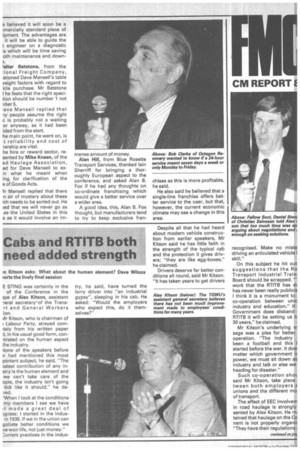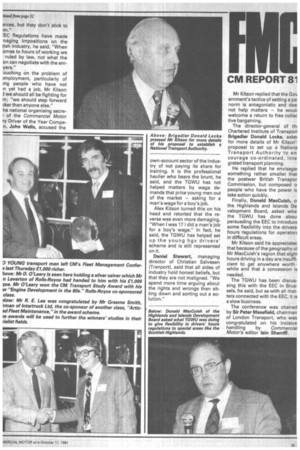Cabs and RTITB both
Page 24

Page 25

If you've noticed an error in this article please click here to report it so we can fix it.
need added strength
ix Kitson asks: What about the human element? Dave Wilcox ports the lively final session E STING was certainly in the of the Conference in the )pe of Alex Kitson, assistant leral secretary'of the Transrt and General Workers ion.
Or Kitson, who is chairman of Labour Party, strayed comqely from his written paper J, in his usual good form, conitrated on the human aspect the industry.
■ Jone of the speakers before n had mentioned this most portant subject, he said. "The atest contribution of any instry is the human element and we can't take care of the ople, the industry isn't going tick like it should," he dered.
'When I look at the conditions my members I see we have it made a great deal of )gress: f started in the indusin 1935. If we in the union can gotiate better conditions we ye won life, not just money." 7.urrent practices in the indus
try, he said, have turned the lorry driver into ."an industrial gypsy", sleeping in his cab. He asked: "Would the employers who expect this, do it themselves?" Despite all that he had heard about modern vehicle construc tion from earlier speakers, Mr Kitson said he has little faith in the strength of the typical cab and the protection it gives drivers; "they are like egg-boxes," he claimed.
Drivers deserve far better con ditions all round, said Mr Kitson. "It has taken years to get drivers recognised. Make no mista driving an articulated vehicle i skill."
On this subject he hit out suggestions that the Ro Transport Industrial Train' Board should be scrapped. "work that the RTITB has c1( has never been really publicis I think it is a monument to co-operation between unic industry and education." If Government does disband RTITB it will be setting us b 30 years," he claimed.
Mr Kitson's underlying rr sage was a plea for better operation. "The industry been a football and this I started before the war. It doe: matter which government I: power, we must sit down as industry and talk or else we heading for disaster."
Such co-operation shot. said Mr Kitson, take place tween both employers 41 unions and the different mó of transport.
The effect of EEC involvem in road haulage is strongly sented by Alex Kitson. He rn. tamed that haulage on the Co nent is not properly organif "They have their regulations ;rice% but they don't stick to im."
:EC Regulations have made naging impositions on the tish industry, he said. "When omes to hours of working we ruled by law, not what the on can negotiate with the emyers."
'ouching on the problem of )mployment, particularly of ing people who have not yet had a job, Mr Kitson we should all be fighting for m; "we should step forward cker than anyone else."
he national organising secre, of the Commercial Motor ry Driver of the Year Compen, John Wells, accused the own-account sector of the industry of not paying its share for training. It is the professional haulier who bears the brunt, he said, and the TGWU has not helped matters by wage demands that price young men out of the market — asking for a man's wage for a boy's job.
Alex Kitson turned this on his head and retorted that the reverse was even more damaging. "When I was 17 I did a man's job for a boy's wage." In fact, he said, the TGWU has helped set up the young hgv drivers' scheme and is still represented on it.
Daniel Stewart, managing director of Christian Salvesen (Tranport), said that all sides of industry hold honest beliefs, but that they are not maligned. "We spend more time arguing about the rights and wrongs than sitting down and sorting out a solution."








































